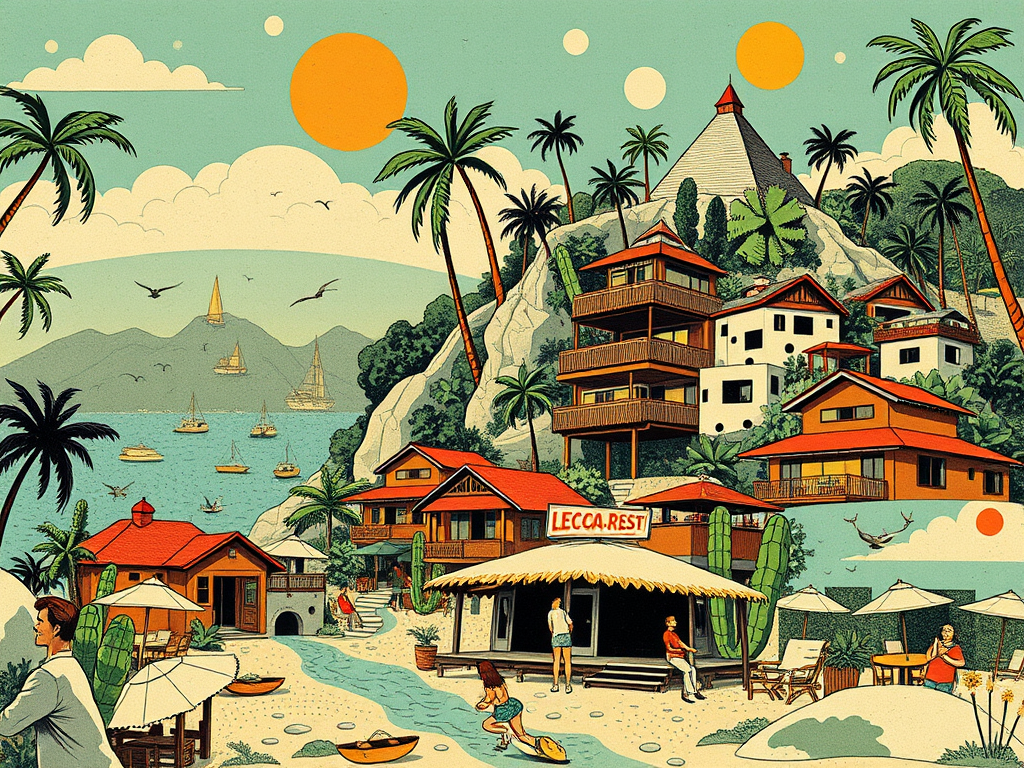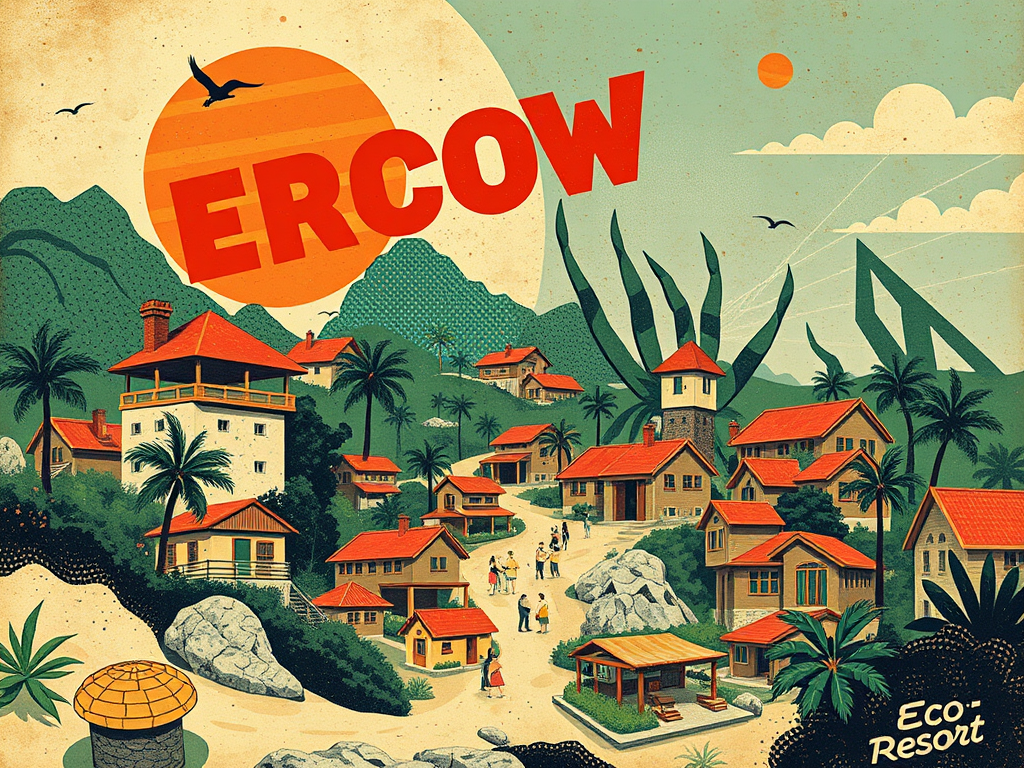
Eco-Resorts and Sustainable Developments: The Future of Greek Real Estate Projects
Reading time: 15 minutes
Table of Contents
- Introduction
- The Rise of Eco-Resorts in Greece
- Sustainable Development Practices in Greek Real Estate
- Economic Impact of Eco-Friendly Projects
- Challenges and Opportunities
- Case Studies: Successful Eco-Resorts in Greece
- Future Outlook for Sustainable Greek Real Estate
- Conclusion
- FAQs
Introduction
As we delve into the evolving landscape of Greek real estate, a compelling trend is emerging that promises to reshape the industry: the rise of eco-resorts and sustainable developments. This comprehensive analysis will explore how these environmentally conscious projects are not only transforming the Greek property market but also contributing to the country’s economic resilience and ecological preservation.
In recent years, Greece has experienced a significant shift in its real estate sector, with a growing emphasis on sustainability and eco-friendly initiatives. This transformation is particularly evident in the tourism and hospitality industries, where eco-resorts are gaining traction as attractive investment opportunities and desirable vacation destinations.
The Rise of Eco-Resorts in Greece
Eco-resorts represent a paradigm shift in the Greek hospitality sector, offering a unique blend of luxury and environmental consciousness. These establishments are designed to minimize their ecological footprint while providing guests with an immersive natural experience. The concept has gained significant momentum, particularly in regions known for their natural beauty, such as the Peloponnese, where property for sale in peloponnese has seen increased interest from eco-conscious investors.
Key Features of Greek Eco-Resorts
- Sustainable architecture and design
- Renewable energy systems (solar, wind, geothermal)
- Water conservation and recycling programs
- Organic, locally-sourced food offerings
- Eco-friendly activities and educational programs for guests
These features not only appeal to environmentally conscious travelers but also contribute to the overall sustainability of the Greek tourism industry. As a result, eco-resorts are becoming increasingly attractive to both domestic and international investors looking to capitalize on the growing demand for green travel experiences.
Sustainable Development Practices in Greek Real Estate
Beyond the hospitality sector, sustainable development practices are permeating various aspects of Greek real estate. From residential complexes to commercial buildings, developers are incorporating eco-friendly elements into their projects to meet the evolving demands of buyers and tenants.
Key Sustainable Development Trends
- Green Building Certifications: An increasing number of Greek properties are pursuing internationally recognized green building certifications such as LEED (Leadership in Energy and Environmental Design) and BREEAM (Building Research Establishment Environmental Assessment Method).
- Energy-Efficient Technologies: Developers are integrating advanced energy-efficient technologies, including smart home systems, high-performance insulation, and energy-efficient appliances, to reduce overall energy consumption.
- Biophilic Design: Incorporating natural elements into building design to promote well-being and connection with nature is becoming more prevalent in Greek real estate projects.
- Sustainable Urban Planning: Cities and municipalities are adopting sustainable urban planning principles, focusing on walkability, green spaces, and public transportation infrastructure.
These sustainable development practices are not only environmentally beneficial but also economically advantageous, as they often result in lower operational costs and increased property values over time.
Economic Impact of Eco-Friendly Projects
The shift towards eco-resorts and sustainable developments is having a significant economic impact on the Greek real estate market and the broader economy. Let’s examine some key economic indicators and trends:
Job Creation and Skill Development
The sustainable development sector is creating new job opportunities across various disciplines, including green architecture, renewable energy engineering, and sustainable tourism management. This trend is contributing to the diversification of the Greek job market and the development of specialized skills within the workforce.
Investment Attraction
Eco-friendly projects are attracting a new wave of both domestic and international investors. The promise of long-term sustainability and the growing consumer demand for green experiences are making these investments increasingly attractive. According to recent data, investments in sustainable real estate projects in Greece have grown by an average of 15% annually over the past five years.
Tourism Revenue Growth
Eco-resorts are tapping into the lucrative market of environmentally conscious travelers. This niche tourism segment is showing stronger growth rates compared to traditional tourism, with eco-tourists often willing to pay premium prices for sustainable accommodations and experiences. The Greek Tourism Confederation reports that eco-tourism revenue has increased by 22% in the last two years, outpacing the growth of conventional tourism sectors.
Challenges and Opportunities
While the trend towards eco-resorts and sustainable developments presents numerous opportunities, it also comes with its share of challenges. Understanding these factors is crucial for investors, developers, and policymakers alike.
Challenges
- Initial Costs: The upfront costs of implementing sustainable technologies and practices can be higher than traditional development methods.
- Regulatory Framework: The need for updated building codes and regulations that accommodate and incentivize sustainable practices.
- Skills Gap: A shortage of skilled professionals in sustainable construction and management techniques.
- Cultural Adaptation: Overcoming traditional mindsets and practices in the construction and hospitality industries.
Opportunities
- Government Incentives: The potential for increased government support and incentives for sustainable development projects.
- Technology Advancements: Ongoing innovations in green technologies are making sustainable solutions more accessible and cost-effective.
- Market Differentiation: Eco-friendly properties have a unique selling proposition in an increasingly competitive market.
- Long-term Cost Savings: While initial investments may be higher, sustainable properties often result in significant operational cost savings over time.
Case Studies: Successful Eco-Resorts in Greece
To better understand the impact and potential of eco-resorts in Greece, let’s examine two successful case studies:
Costa Navarino, Peloponnese
Costa Navarino is a prime example of large-scale sustainable resort development in Greece. Located in the Peloponnese region, this luxury eco-resort has set new standards for environmental stewardship in the hospitality industry.
Key Sustainability Features:
- 11 MW solar park, one of the largest in Europe
- Advanced water management system, reducing water consumption by 40%
- Preservation and expansion of local olive groves
- Electric vehicle charging stations and bike-sharing program
The resort’s commitment to sustainability has not only minimized its environmental impact but has also contributed significantly to the local economy, creating over 1,200 jobs and promoting sustainable tourism in the region.
Onar Andros, Cyclades
Onar Andros represents a smaller-scale, boutique approach to eco-resorts. Located on the island of Andros, this intimate retreat showcases how sustainability can be seamlessly integrated into traditional Greek island architecture.
Sustainability Highlights:
- Use of local, natural building materials
- On-site organic farm supplying the resort’s restaurant
- Rainwater harvesting and greywater recycling systems
- Education programs on local ecology and sustainable living
Onar Andros has successfully tapped into the growing market of eco-conscious travelers seeking authentic, sustainable experiences. The resort’s success has inspired similar projects across the Greek islands, contributing to a more sustainable tourism model in the region.
Future Outlook for Sustainable Greek Real Estate
As we look towards the future of Greek real estate, several key trends and predictions emerge:
Increased Integration of Smart Technologies
The convergence of sustainability and smart technologies is expected to accelerate. Future eco-resorts and sustainable developments will likely incorporate advanced IoT (Internet of Things) systems for energy management, predictive maintenance, and enhanced guest experiences.
Rise of Regenerative Design
Moving beyond sustainability, the concept of regenerative design – where buildings and developments actively contribute to the restoration of ecosystems – is gaining traction. This approach could see future Greek real estate projects not only minimizing their environmental impact but actively improving their surroundings.
Expansion into Urban Centers
While many eco-resorts are currently located in rural or coastal areas, there’s potential for sustainable development principles to be increasingly applied in urban settings. This could lead to the emergence of eco-friendly urban hotels and mixed-use developments in Greek cities.
Greater Policy Support
As the benefits of sustainable development become more apparent, it’s likely that Greek policymakers will introduce more robust incentives and regulations to support eco-friendly real estate projects. This could include tax breaks, expedited permitting processes, or mandatory sustainability standards for new developments.
Conclusion
The rise of eco-resorts and sustainable developments represents a significant and positive shift in the Greek real estate landscape. These projects are not only addressing pressing environmental concerns but are also opening up new economic opportunities and reshaping the country’s tourism industry.
As Greece continues to position itself as a leader in sustainable tourism and development, the potential for growth in this sector remains substantial. For investors, developers, and policymakers, embracing this trend offers the dual benefits of economic prosperity and environmental stewardship.
The future of Greek real estate is undoubtedly green, and those who adapt to this new paradigm will be well-positioned to thrive in the evolving market. As we move forward, the success of eco-resorts and sustainable developments will likely inspire further innovation and investment, cementing Greece’s position as a pioneering destination for eco-conscious travelers and investors alike.
FAQs
-
What defines an eco-resort in Greece?
An eco-resort in Greece is characterized by its commitment to environmental sustainability, typically featuring energy-efficient design, renewable energy sources, water conservation measures, waste reduction programs, and the use of locally sourced, organic materials. These resorts often also offer educational programs on environmental conservation and support local ecosystems and communities.
-
How do sustainable developments impact property values in Greece?
Sustainable developments tend to have a positive impact on property values in Greece. Properties with green certifications or eco-friendly features often command higher prices and experience better value retention over time. This is due to growing consumer demand for sustainable living spaces and the long-term cost savings associated with energy-efficient buildings.
-
Are there government incentives for eco-friendly real estate projects in Greece?
While specific incentives vary, the Greek government has been increasingly supportive of sustainable development. Some current incentives include tax breaks for energy-efficient renovations, subsidies for renewable energy installations, and expedited permitting processes for projects meeting certain sustainability criteria. It’s advisable to check with local authorities for the most up-to-date information on available incentives.
-
How do eco-resorts contribute to local economies in Greece?
Eco-resorts contribute to local economies in several ways. They create jobs in both construction and ongoing operations, often prioritizing local employment. These resorts typically source materials and food locally, supporting regional producers and artisans. Additionally, by attracting eco-conscious travelers, they help diversify and extend the tourist season, providing more stable year-round income for local communities.
-
What are the main challenges in developing eco-resorts in Greece?
The main challenges in developing eco-resorts in Greece include higher initial investment costs for sustainable technologies, navigating complex regulatory environments, potential resistance from traditional tourism stakeholders, and the need for specialized expertise in sustainable design and operations. Additionally, balancing luxury amenities with environmental conservation can be challenging, particularly in sensitive ecological areas.

Article reviewed by August Schmidt, Alternative Investments Expert | Diversifying Portfolios with Unique Assets, on March 22, 2025








